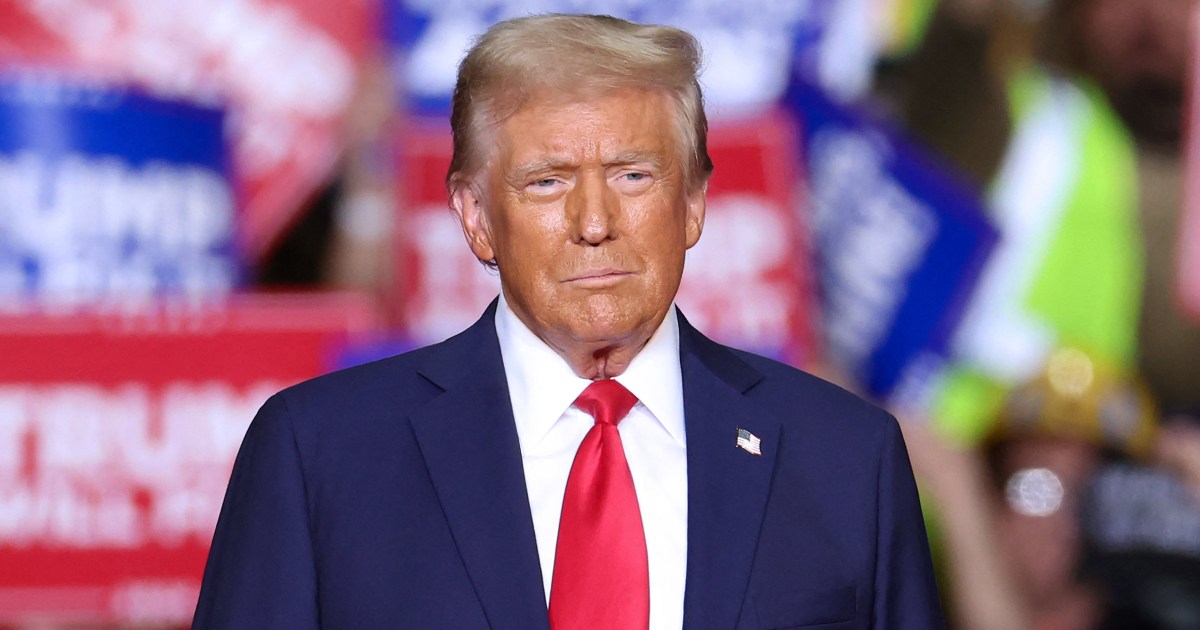President-elect Donald Trump said Monday that his incoming administration would slap new tariffs on imported goods from Mexico, Canada and China, solidifying a key campaign promise that could have a major impact on trade.
Trump said in a post on Truth Social that he plans to impose a 25% tariff on products imported from Mexico and Canada, framing the proposal as a response to the ongoing fentanyl crisis.
“On January 20th, as one of my many first Executive Orders, I will sign all necessary documents to charge Mexico and Canada a 25% Tariff on ALL products coming into the United States, and its ridiculous Open Borders,” Trump wrote. “This Tariff will remain in effect until such time as Drugs, in particular Fentanyl, and all Illegal Aliens stop this Invasion of our Country!”
Trump said that he would also seek to impose additional tariffs on China.
“I have had many talks with China about the massive amounts of drugs, in particular Fentanyl, being sent into the United States — But to no avail,” Trump wrote. “Until such time as they stop, we will be charging China an additional 10% Tariff, above any additional Tariffs, on all of their many products coming into the United States of America.”
In response to Trump’s announcement, the Chinese Embassy in Washington said that economic and trade cooperation between the U.S. and China was “mutually beneficial in nature.”
“No one will win a trade war or a tariff war,” embassy spokesperson Liu Pengyu said late Monday in a post on X.
He said China had taken steps to stop the flow of illegal drugs since President Joe Biden and Chinese President Xi Jinping agreed to resume counternarcotics cooperation at a meeting in California last year.
“All these prove that the idea of China knowingly allowing fentanyl precursors to flow into the United States runs completely counter to facts and reality,” Liu said.
Canadian officials stressed the close relationship between Canada and the U.S. and said they would discuss trade and border security with the incoming Trump administration.
“Canada places the highest priority on border security and the integrity of our shared border,” Deputy Prime Minister Chrystia Freeland and Public Safety Minister Dominic Leblanc said in a joint statement. “Our relationship today is balanced and mutually beneficial, particularly for American workers.”
The Mexican Embassy did not immediately respond to a request for comment on Monday night.
Mexico and Canada are the United States’ top two trading partners, accounting for nearly 30% of trade volumes. The vehicle manufacturing industry, dairy, paper products, and building supplies such as wood are just some of the products that would face disruptions.
As NBC News has reported, the Department of Homeland Security has said that the vast majority of the fentanyl law enforcement seizes as it is being smuggled into the United States is discovered in personal vehicles driver across legal border crossings by U.S. citizens.
Data obtained by the libertarian Cato Institute in August showed that U.S. citizens comprised 80 percent of individuals caught with fentanyl during border crossings at ports of entry from 2019 to 2024.
The U.S., China’s largest export market, already imposes a number of tariffs on Chinese goods. In addition to maintaining most of the tariffs Trump introduced in his first term, this year Biden increased the tariff rate on $18 billion in Chinese products such as electric vehicles, the tariff on which has quadrupled from 25% to 100%.
On the campaign trail, Trump declared he would impose a 20% blanket tariff on all imports, and add tariffs of at least 60% to Chinese products.
During his September presidential debate with then-Democratic nominee Kamala Harris, who called Trump’s proposed tariffs a “sales tax on the American people,” Trump cast them as a kind of payback.
“Other countries are going to finally, after 75 years, pay us back for all that we’ve done for the world, and the tariff will be substantial,” he said.
Any proposed tariffs are likely to receive some pushback from businesses and on Capitol Hill, as NBC News has previously reported.
Economists and retail trade groups estimate that tariffs on goods flowing into the U.S. could cost Americans $78 billion annually. For example, a $50 pair of shoes could cost almost $65, according to the National Retail Federation. The cost of a $2,000 mattress could rise by $190. Retail chain Five Below, online outlet Wayfair and Dollar Tree are some of the most vulnerable stores in a trade war, according to a CNBC analysis.
The tariffs floated by Trump would upend one of the biggest economic deals of his first term.
The U.S.-Mexico-Canada Agreement, also known as the USMCA, was negotiated during Trump’s first administration and went into effect in July 2020. Tariffs proposed by Trump in his social media posts would likely violate the pact, according to Arturo Sarukhan, Mexico’s former ambassador to the U.S.

